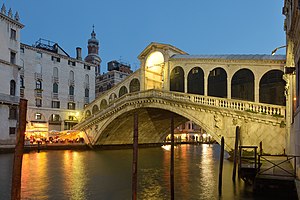Rialto Bridge
Rialto Bridge Italian: Ponte di Rialto | |
|---|---|
 Rialto Bridge crossing the Canal Grande | |
| Coordinates | 45°26′17″N 12°20′10″E / 45.4380°N 12.3360°E |
| Carries | pedestrian bridge[1] |
| Crosses | Grand Canal |
| Locale | Venice, Veneto, Italy |
| Characteristics | |
| Design | stone arch bridge |
| Width | 22.90 metres (75.1 ft)[2] |
| Height | 7.32 metres (24.0 ft) (arch only) |
| Longest span | 31.80 metres (104.3 ft) |
| History | |
| Construction start | 1588 |
| Construction end | 1591 |
| Location | |
 | |
| Click the map for an interactive, fullscreen view | |
The Rialto Bridge (Italian: Ponte di Rialto; Venetian: Ponte de Rialto) is the oldest of the four bridges spanning the Grand Canal in Venice, Italy. Connecting the sestieri (districts) of San Marco and San Polo, it has been rebuilt several times since its first construction as a pontoon bridge in 1173, and is now a significant tourist attraction in the city.[3]
The present stone bridge is a single span designed by Antonio da Ponte. Construction began in 1588 and was completed in 1591.[3] It is similar to the wooden bridge it succeeded. Two ramps lead up to a central portico. On either side of the portico, the covered ramps carry rows of shops. The engineering of the bridge was considered so audacious that architect Vincenzo Scamozzi predicted future ruin. The bridge has defied its critics to become one of the architectural icons, and top tourist attractions, in Venice.[4]
History
[edit]

The first dry crossing of the Grand Canal was a pontoon bridge built in 1181 by Nicolò Barattieri. It was called the Ponte della Moneta, presumably because of the mint that stood near its eastern entrance.[5]
The development and importance of the Rialto market on the eastern bank increased traffic on the floating bridge, so it was replaced in 1255 by a wooden bridge.[5] This structure had two ramps meeting at a movable central section, that could be raised to allow the passage of tall ships. The connection with the market eventually led to a change of name for the bridge. During the first half of the 15th century, two rows of shops were built along the sides of the bridge. The rents brought an income to the State Treasury, which helped maintain the bridge.
Maintenance was vital for the timber bridge. It was partly burnt in the revolt led by Bajamonte Tiepolo in 1310. In 1444, it collapsed under the weight of a crowd rushing to see the marriage of the Marquis of Ferrara[3] and it collapsed again in 1524.

The idea of rebuilding the bridge in stone was first proposed in 1503. Several projects were considered over the following decades. In 1551, the authorities requested proposals for the renewal of the Rialto Bridge, among other things. Plans were offered by famous architects, such as Jacopo Sansovino, Palladio and Vignola, but all involved a Classical approach with several arches, which was judged inappropriate to the situation. Michelangelo also was considered as designer of the bridge.[3]
Other names
[edit]It was called Shylock's bridge in Robert Browning's poem "A Toccata of Galuppi's".
See also
[edit]- Miracle of the Relic of the Cross at the Ponte di Rialto (depiction of wooden bridge)
- List of buildings and structures in Venice
- Ponte Vecchio
- Krämerbrücke
- Pulteney Bridge
References
[edit]- ^ Fulton, Charles Carroll (1874). Europe Viewed Through American Spectacles. Philadelphia: J. B. Lippincott & Co. p. 242. Retrieved 5 September 2008 – via Internet Archive.
There being no vehicles or horses in Venice, it is simply for pedestrians.
- ^ "Rialto Bridge". structurae.net. Archived from the original on 14 November 2019. Retrieved 14 November 2019.
- ^ a b c d Dupré, Judith (2017). Bridges: A History of the World's Most Spectacular Spans. New York: Hachette/Black Dog & Leventhal Press. ISBN 978-0-316-47380-4.
- ^ Povoledo, Elisabetta (30 March 2017). "3 Are Held on Suspicion of Plot to Attack Rialto Bridge in Venice". The New York Times. Retrieved 31 March 2017.
The Italian police announced on Thursday that they had dismantled a suspected jihadist cell whose members had discussed blowing up the Rialto Bridge, one of the top tourist attractions in Venice
- ^ a b Molmenti, Pompeo; Horatio Forbes Brown (13 October 1906). Venice: Its Individual Growth from the Earliest Beginnings to the Fall of the Republic. Chicago: A.C. McClurg & Co. p. 29. Retrieved 5 September 2008 – via Internet Archive.
External links
[edit]- Rialto Bridge at Structurae
- Satellite image from Google Maps
 Rialto Bridge travel guide from Wikivoyage
Rialto Bridge travel guide from Wikivoyage- Rialto Bridge
| Preceded by Il Redentore |
Venice landmarks Rialto Bridge |
Succeeded by San Giorgio Maggiore |
- Bridges completed in the 16th century
- Buildings and structures completed in 1591
- Transport infrastructure completed in the 1590s
- Bridges with buildings
- Bridges in Venice
- Covered bridges in Italy
- Pedestrian bridges in Italy
- Stone bridges in Italy
- Tourist attractions in Venice
- Wooden bridges in Italy
- Failed terrorist attempts in Italy
- Islamic terrorism in Italy
- Grand Canal (Venice)

